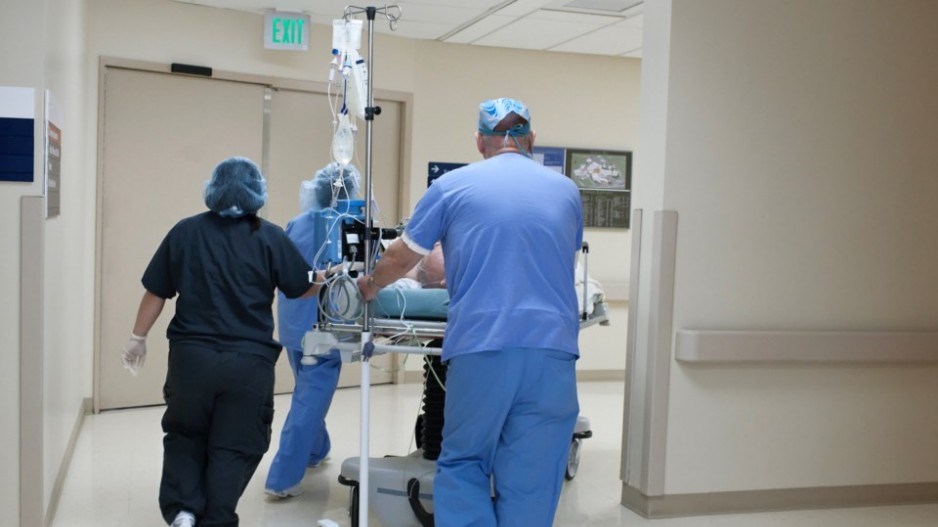Tumbling public confidence in the BC NDP government’s ability to solve the crises in health care, housing and cost of living offer a glimmer of hope to other parties that the governing New Democrats aren’t quite as unassailable as it might otherwise appear.
A new survey by the Angus Reid Institute shows the percentage of people asked if British Columbia is doing a good job on health care has plunged from a country-leading 63 per cent in 2020 (during the peak of the COVID-19 pandemic) to a dismal 27 per cent last month.
It’s part of a national trend of public dissatisfaction, though provinces like Alberta and Saskatchewan have fared better.
“The drop is starkest in British Columbia,” Angus Reid noted in its latest report, which surveyed 3,749 Canadians from Nov. 24 to Dec. 1, 2023.
Around 81 per cent of people surveyed said the BC NDP is doing a poor job responding to the rising cost of living, 83 per cent cited poor progress on housing affordability and 70 per cent were unhappy with the response to health-care wait times and services.
In category after category, from education to drug use to the economy, people expressed to Angus Reid more unhappiness with the B.C. government’s performance now than just three years ago.
“The collapse in the public's view of how government is managing these problems is quite startling,” said BC United leader Kevin Falcon.
“What that tells me is there is a public out there that is very open to the time-for-a-change argument.
“For a government that's been there two terms, at some point in British Columbia they're going to ask the fundamental question: Are we better off today than we were seven, almost eight, years ago when the NDP first were elected? And I think the answer is going to reflect what we're seeing in these polls. No, we are not.”
At least, that’s what parties like BC United, the BC Conservatives and the BC Greens are hoping will happen in the lead up to the Oct. 19 provincial election.
New Democrats, though, believe otherwise. They point to other public opinion polling that shows, even with unhappiness on individual issues, voters still indicate they are more likely to re-elect the NDP to a third term than support the other parties.
Falcon said the issue-based polling is more in line with the frustrations he’s hearing from the public, and that voter-intention polls (some of which have his party in third place, trailing the BC Conservatives) are less accurate because people have yet to actually turn their minds to who they’ll support in a provincial election that’s still 10 months away.
Premier David Eby, whose personal approval ratings also remain solid one year after taking the job, said public dissatisfaction on health care comes after “the legacy of the pandemic and chronic underfunding of our health care system for many years.”
“Health care was one of the key issues I raised and prioritized in my swearing ceremony as one our government would be working on,” Eby said Tuesday, pointing to new self-testing for HPV to prevent cervical cancer as one of the “practical solutions” his government is working on, in addition to reforms to physician and hospital funding.
“Health care and ensuring every British Columbian has access to health care they need in the communities they live is a huge priority and will remain so.”
The Angus Reid survey noted that a nation-wide drop in public confidence in health care comes as provinces spend record amounts, and after Ottawa inked a new health funding deal.
B.C. New Democrats have boosted health funding by $10 billion since taking power, and the province spends almost 40 per cent of its entire annual budget on delivering health services.
Yet, it is harder to find a family doctor, ERs are more crowded than ever and wait times in critical areas like cancer care are among the worst in the country, leaving the government open to criticism about its decision-making.
“Our health-care system has to be open to innovation and change, we have to embrace it, not be afraid of it,” said Falcon, who pledged to deliver his own health-care plan “in the coming months.”
“Right now we've got, unfortunately, a government that very ideologically is convinced only government must operate every aspect of the health-care system. And the problem is we're failing patients. We're failing British Columbians.
“What I want to be held accountable for is the results that we're getting, not on how much we're spending.”
The public dissatisfaction on issues, as captured by Angus Reid, gives BC United a bit of hope that a change narrative is possible for this fall’s election.
But the NDP’s opponents are up against a premier who not only says he’s cognizant of all the pent-up public frustration, he still has 10 months to frantically try and address it.
Rob Shaw has spent more than 15 years covering B.C. politics, now reporting for CHEK News and writing for Glacier Media. He is the co-author of the national bestselling book A Matter of Confidence, host of the weekly podcast Political Capital, and a regular guest on CBC Radio.




